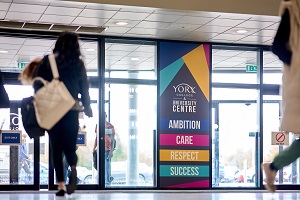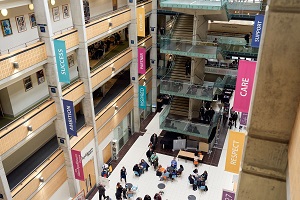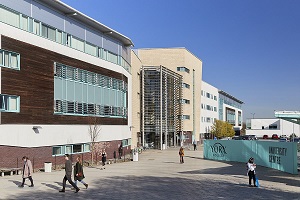Management and Administration T Level: Preparing young learners for the world of work
How York College and City & Guilds are setting learners up for future career success
With qualifications in sectors including engineering and building services more frequently grabbing the headlines, Management and Administration might not be something that would have initially been considered as an obvious T Level option, but its popularity tells the story of the value it can provide for learners. The combination of classroom and industry placement is ideally placed to give young learners a taste of working life and an opportunity to start building their business network while also developing the knowledge and skills that will help them succeed in an administrative or managerial role in the future.
As is the case for all T Level qualifications the T Level in Management and Administration is a two-year programme available for 16 to 19 year olds where learners will study both a core component designed to provide a broad foundation of knowledge and skills and an occupational specialism which aims to help learners reach threshold competence – meaning that they are at the necessary standard to enter the industry.

For York College this T Level and its industry placement component have created opportunities to tailor their offering to local skills needs, helping provide greater access to employment opportunities for their learners who are completing the Team Leadership occupational specialism, while also supporting their community and working to close local skills gaps.
Choosing the Management and Administration T Level
Identifying the right qualifications to offer is a big decision for colleges and there are many factors that need to be taken into account, something that Louise Clarkson of York College is well aware of. “A lot of what we do within our curriculum area is driven by employers and what they want to see from the workforce. We're in an area of a lot of hospitality, a lot of tourism, a lot of retail and a lot of big businesses as well. People we spoke to said that the skills they were missing were those team leadership skills and management skills as well.”
“A lot of what we do within our curriculum area is driven by employers and what they want to see from the workforce.”
For Louise and the rest of the team responsible for curriculum decisions the Management and Administration T Level’s focus on Business Context, Quality Compliance and Change Management along with the industry placement made the T Level an invaluable option for the college and its students.
This is a sentiment shared by second year T Level student Lee who chose the Management and Administration T Level over an equivalent BTEC upon completing GCSEs and leaving secondary school. “It just sounded better for me than doing a BTEC definitely the practical side of it helped as well.”
The industry placement

With the industry placement a key factor in both the college and learners’ decision to pursue T Levels, securing suitable placements for their students was a significant priority for Louise and her team. “I think we've got some really good connections with local employers. We've got a placement team in college who've worked very hard but also as a curriculum area we've been out and visited employers and talked to people who've got businesses and work in industry. As a curriculum area we've also made sure that we keep our industry experience up by going and spending time with employers and doing a bit of placement work ourselves.”
“I think we've got some really good connections with local employers. We've got a placement team in college who've worked very hard but also as a curriculum area we've been out or I've been out and visited employers.”
Olivia and Imogen, two other second year learners completed their placements within the business support function for City of York Council, gaining valuable experience in a range of administrative areas. “We would deal with creditors in the morning, so we’d do invoices for the work, invoices for business support and then in the afternoon we’d do something else so we'd be in the mail room, and we'd scan through all the mail and put it all into the system or we would work in parking so pursuing parking fines and that’s all on bespoke systems.”
The placement has been incredibly impactful for Lee who after receiving a job offer while completing his placement, is continuing to work with the engineering company where he was placed as a human resources administrator. “I was doing a lot of work like monitoring absences and filing contracts and signed paperwork and documents that we had for people that are starting in the company and just dealing with general inquiries into HR and that’s something that I enjoyed and wanted to do.”
The placement also offered opportunities to gain transferable career skills with the council supporting Imogen and Olivia through courses in using excel and all three learners having the chance to complete practice interviews, giving them an insight into the types of questions and expectations involved in a professional interview.
Being on-programme
All three learners are completing the Team Leadership and Management occupational specialism and are finding the training they complete in college an interesting complement to their experience on placement. With a mixture of group and individual work and tasks like presenting to the class, preparing reports around the work they have been doing, the classroom learning side of the programme is able to instil knowledge and behaviours that will be needed in the workplace both on placement and in the future.
Lee has found that while the training has prepared him for some parts of his placement there are other things that just have to be learned on the job, showing the value of including workplace experience as part of the qualification. “There are things that you will do in the placement that are very specific to that job so some parts will cross over with the training, but some things will be new to you when you do them on placement.”
“Things like data protection and the management side helped when we were going on placement because obviously management and admin is what we’re doing on the programme and in our roles.” Olivia added.

This alignment didn’t happen by accident and the T Levels team at York College worked hard to combine the resources provided by City & Guilds with their own and deliver them in a way that set learners up for success. “We've added in things like our own preparation for projects and work skills for placement. Our students don't go out on placement until at least the February of the first year because we want that time in college. So the second years are in three days a week and the first years are currently in 3 1/2 days. We've front loaded the teaching to get them ready for placement because we think it's really important not to send them out to employers unless we know that they're ready for that.” Louise commented.
This approach was not without its challenges for the delivery team at the college, but Louise is confident that it has been worth it. “There was a lot of preparation, and you know at times of change it’s never easy But we were really confident from the training that we've done and the people that we've spoken to that it was the way that we wanted to go, and the results last year really sort of showed that that was a good thing to do.”
“The City & Guilds training that they've offered, we've taken advantage of a lot of that as well because we think as teaching staff it's really important that we keep up our CPD."
Louise also referenced the support received from City & Guilds as being a key part of successfully preparing for and delivering the qualification. “The City & Guilds training that they've offered, we've taken advantage of a lot of that as well because we think as teaching staff it's really important that we keep up our CPD and we talk to students a lot about that and about reflecting on what they've done. Then day to day I know that if I’ve got an issue, I can email Dom Green our Technical Advisor from City & Guilds and he’ll reply quickly.”
Where next for the learners?
With the work experience and industry connections gained by completing an industry placement, the breadth of sector knowledge and skills provided by the training and each T Level acting as the equivalent of three A Levels, there are many options for T Level students upon graduation.
For Olivia one of the biggest advantages of completing her industry placement was learning what she does and doesn’t want in a job, something that she will be keeping in mind as she considers her next steps. “I’ve been able to focus in on what I like best. I know I don’t want to be on a computer all day, I need to be interacting with people and I know that hybrid working wouldn’t suit me, I want to be in the office.”
Imogen plans to use the knowledge and experience she has gained from completing the T Level to continue into further education, using her T Level certification as part of her university application, where a successfully completed T Level can be worth up to 168 UCAS points or 3 A* at A Level.
Building on his industry placement, Lee intends to accept the job offer he has received and enter the industry immediately after completing the course. “The biggest opportunity that I got from doing this T Level is that the business I am placed with want to offer me a permanent job after college is finished.”
“The biggest opportunity that I got from doing this T Level is that the business I am placed with want to offer me a permanent job after college is finished.”
Louise has seen positive results for students both in terms of university applications and other options upon graduation. “In general, universities have been very open to offering places for our students and of the people who've applied to university all of them have offers. It’s also opened the door to work opportunities for people as well.”
Find out more about T Levels or sign up for delivery T Levels